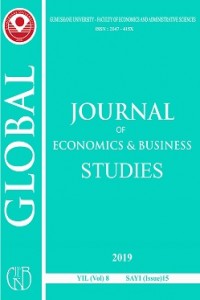Öz
Islamic finance which appeared from
the concept of Islamic economy continued to develop in the international
financial system in recent years. In this context, it is estimated that the
total size of the global interest-free finance system reached USD 2.2 trillion
at the end of 2016. Although Islamic finance appears to be an alternative to
respond to the financial needs of people that have high interest sensitivity,
it may be preferred at times by people that don’t have this sensitivity. This
study aims to determine the effect of political identity definitions on
perception of Islamic finance. In this direction, a questionnaire was conducted
to the sample group which selected from students of Karadeniz Technical University
and the data obtained were tested by ANOVA method. According to the results of
analysis, although there is a difference in Islamic financial perceptions of
people with different political identity definitions in terms of reliability,
religious sensitivity and preference factors, there is not a significant
difference in terms of interest perception, investment products suitability and
knowledge factors.
Anahtar Kelimeler
Kaynakça
- ABDULLAH, Abdul Aziz; SIDEK, Rokiah and ADNAN, Ahmad Azrin (2012), “Perception of Non-Muslims Customers towards Islamic Banks in Malaysia”, International Journal of Business and Social Science, 3(11), 151-163.
- AKBAR, Saeed; SHAH, Syed Zulfiqar Ali and KALMADI, Shahin (2012), “An Investigation of User Perceptions of Islamic Banking Practices in The United Kingdom”, International Journal of Islamic and Middle Eastern Finance and Management, 5(4), 353-370.
- ASUTAY, Mehmet (2007), “A Political Economy Approach to Islamic Economics: Systemic Understanding for an Alternative Economic System”, Kyoto Bulletin of Islamic Area Studies, 1(2), 3-18.
- GENCTURK, Mehmet and COBANKAYA, Fatma Tuba (2015), “Determination of Level of Awareness In The Region West Mediterranean of Participation Banks”, Bankacılar Dergisi, 93, 82-105.
- HAQUE, Ahasanul; OSMAN, Jamil and İSMAIL, Ahmad Zaki (2009), “Factor Influences Selection of Islamic Banking: A Study on Malaysian Customer Preferences”, American Journal of Applied Sciences, 6(5), 922-928.
- KADIR HAS UNIVERSITY (2017), “Survey on Social and Political Trends in Turkey", [Accessed Address: http://ctrs.khas.edu.tr/sources/TSSEA-2017_vfinal.pdf, Date Accessed: 12.07.2018].
- KAAKEH, Abdulkader; HASSAN, M. Kabir and ALMAZOR, Stefan F. Hemmen (2018), “Attitude of Muslim minority in Spain towards Islamic finance”, International Journal of Islamic and Middle Eastern Finance and Management, 11(2), 213-230.
- OKUMUS, H. Saduman and GENC, Elif Güneren (2013), “Interest Free Banking in Turkey: A Study of Customer Satisfaction and Bank Selection”, European Scientific Journal, 9(16), 144-166.
- OZEN, Ercan; SENYILDIZ, Leyla and AKARBULUT, Kenan (2016), “Islamic Banking Perception: The Case of Usak City”, Journal of Accounting, Finance and Auditing Studies, 2(4), 1-9.
- OZSOY, Ismail; GORMEZ, Birol and MEKIK, Seden (2013), “Reasons for Preference of Participatory Banks in Turkey: An Empirical Investigation”, Journal of Management and Economics, 20(1), 187-206.
- PAKER, Kamile Oya and AKCALI, Selda Icin (2012), “The Individualization of Religion: A Scale Study on University Youth”, Gaziantep University Journal of Social Sciences, 11(4), 1440-1459.
- PEHLIVAN, Pınar (2016), “The Participation Banking in Turkey and Its Importance in Banking Sector”, The Journal of Social and Economic Research, 16(31), 296-324.RAMADAN, Zeyad Saleem (2013), “Jordanian Criteria for Islamic Banks Selection. Evidence from the Jordanian Banking Sector”, International Journal of Academic Research in Accounting, Finance and Management Sciences, 3(3), 139–145.
- PBAT, (PARTICIPATION BANKS ASSOCIATION OF TURKEY), (2017), “Participation Banks 2017”, [Accessed Address: http://www.tkbb.org.tr/Documents/Yonetmelikler/Participation-Banks-2017-Sector-Report_ING.pdf, Date Accessed: 05.08.2018].
- RIAZ, Umair; KHAN, Musafar and KHAN, Naimat (2017), “An Islamic banking perspective on consumers’ perception in Pakistan”, Qualitative Research in Financial Markets 9(4), 337-358.
- TORAMAN, Cengiz; ATA, H. Ali and BUGAN, Mehmet Fatih (2015), “A Study on Customer Perception towards the Islamic Banking Operations”, Gaziantep University Journal of Social Sciences, 14(4), 761-779.
- YILDIRIM, Ismail and CAKAR, Recep (2016), “A Study on The Factors Influencing The Preference of Islamic Banking”, Global Business Research Congress, May 26-27, Istanbul, Turkey.
Ayrıntılar
| Birincil Dil | İngilizce |
|---|---|
| Bölüm | Makaleler |
| Yazarlar | |
| Yayımlanma Tarihi | 10 Temmuz 2019 |
| Yayımlandığı Sayı | Yıl 2019 Cilt: 8 Sayı: 15 |

Bu eser Creative Commons Atıf-GayriTicari 4.0 Uluslararası Lisansı ile lisanslanmıştır.


